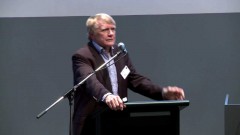 19th October, 5pm
19th October, 5pm
University of New England
Arts Lecture Theatre 1
Free drinks will be provided after the lecture thanks to our Sponsors Sustainable Living Armidale
Snow is a UNE Rural Science graduate who has worked in climate change research, research funding and policy for more than 30 years. As a Chief Scientist within the Commonwealth Department of Primary Industries he was a member of the Australian Delegation to the Kyoto CC negotiations. Recently he has chaired the Expert Advisory Panel directing the Department’s Carbon Farming Futures Climate Change RDE program , co-ordinated the Primary Industries Adaptation Research Network of NCCARF the Departments and directed the development of a Climate Change Research Strategy for Primary Industries. His current research investigates the Adaptation of the Australian Wine Industry to climate change.

Underpinning everything else, I am thankful:
– that this article was posted;
– for Professor Barlow’s effort and time;
– for the transparency which comes with having one’s lecture posted on YouTube;
– that Sustainable Living Armidale exists;
– that the Australia New Zealand Society for Ecological Economics Conference is being held/continues to be held;
– that the Australia New Zealand Society for Ecological Economics 2015 Conference is being held here in Armidale (where we live); and last but not least
– to you reader for your time in reading below and for all attention given.
It is not for the first time in my life that I am questioning – not necessarily disagreeing with – another. In this case, Professor Barlow has many years experience and has taken up positions of high importance in his 30 year career. Sustainable Living Armidale has also sponsored his talk with drinks after Professor Barlow’s lecture on the 19th. I further note that Professor Barlow is listed as a keynote speaker for The Australia New Zealand Society for Ecological Economics (ANZSEE) 2015 Conference at the University of New England. The thought which comes to mind in continuing to write this comment is “gosh.”
I am questioning the narrative underpinning Professor Barlow’s talk i.e. the one uploaded to YouTube and included in this article. I have listened to it in full, along with pausing at certain presentation slides.
In this lecture, Professor Barlow speaks about monetisation of ecosystem services. Having post-graduate qualifications in applied finance and investment, as well as over ten years work experience in financial services (and now studying sustainability), I have a view on this.
In essence, my assertion is that money and the financial system by which a society operates ought to conform to the needs of people. This is in contrast to, for example, setting up a farming enterprise (or anything else for that matter) to take into account financial returns. I am not asserting that the latter is an invalid approach – especially at the level of the individual. I am asserting that the former is more important.
The 2012 Sustainable Farming System Forum (which is where the YouTube video is drawn from) and the 2015 Australia New Zealand Society for Ecological Economics conference are places where matters of societal importance can be raised.
If we are to transition to sustainability, it is this bigger picture perspective that needs to be adopted. If the monetisation of ecosystem services is to be raised at all, it should in the context of changing the financial system so that farmers may operate sustainably. This – first and foremost – ought to be in environmental sustainability.
Since we humans are entirely, utterly and inescapably dependent on the health of the planet (rather than the operations of money), you cannot have financial sustainability (or any other form of sustainability) if you do not have environmental sustainability.
What Professor Barlow presents in the YouTube video is a framework for how farmers can negotiate the financial world so that they, individually, can stay in business. It has a place. Namely, in providing advice to individual farmers. As expressed above, Australia New Zealand Society for Ecological Economics Conferences are a different context.
Details of my questioning of Professor Barlow’s narrative are presented under the YouTube video.
Best regards,
Tom Livanos.
tom.369@hotmail.com